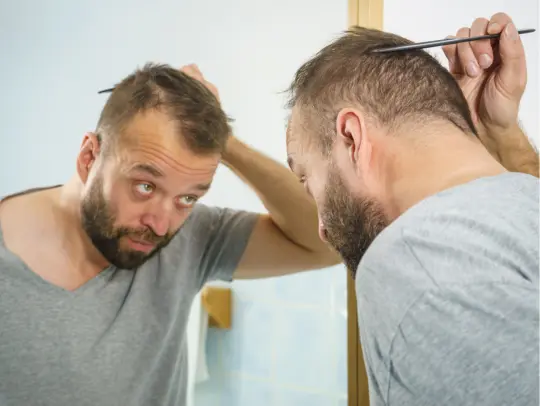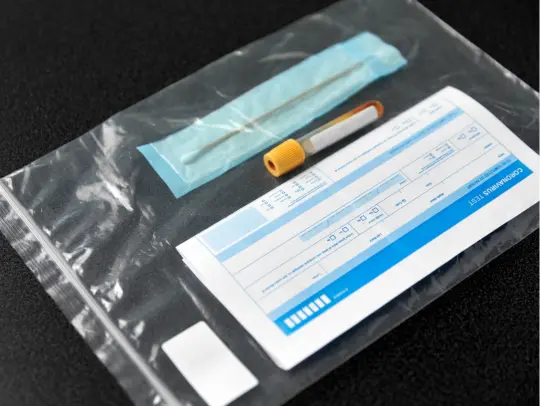
Nurse Practitioner Clarissa - Going Gray From Stress? Here's What You Need to Know
Going Gray From Stress? Here's What You Need to Know
Ever heard about someone's hair turning gray after a super stressful event? While your hair won't actually go silver overnight (despite what movies might show), there's real truth behind stress making you go gray faster. Let's dive into what's really happening when stress messes with your hair color and what you can actually do about it.
Why We Go Gray (And It's Not Just Because of Birthdays)
Let's be real—when most of us spot that first gray hair, we blame getting older. And yes, age is definitely the main culprit behind silver strands. But here's the kicker: that stress from your insane work deadline or family drama? It could be fast-tracking your journey to Gray Town.
Here's what's actually happening up there: your hair follicles contain tiny color-making cells that pump pigment into each strand as it grows. As you age, these color factories gradually shut down. No pigment means no color—hello, gray hair!
Doctors have a funny rule they call the "50-50-50 rule": about half of us will have about half gray hair by age 50. But this varies a lot depending on your background. If you're Caucasian, you might start seeing grays in your mid-thirties. Asian? Probably late thirties. African descent? You typically get a longer pigment pass until your mid-forties.
Stress and Your Strands: How Worrying Wipes Out Your Color
So how exactly does your nightmare boss or mounting bills turn your hair gray? Science has finally figured out the connection, and it's pretty wild.
When you're stressed, your body flips into survival mode—that famous "fight-or-flight" response. It's great for dodging danger, but terrible for your hair color. This stress response floods your body with hormones that actually damage the little stem cell factory that keeps your color-making cells stocked up and working. When chronic stress keeps hammering these stem cells, they get depleted faster than they should—and boom, early grays.
There's also this condition with a fancy name—telogen effluvium—which is basically when stress shocks a bunch of your hair follicles into their "rest and shed" phase all at once. Not only might you notice more hair in your brush, but this disruption can mess with those color-making cells too, speeding up the silver transformation.
Red Flags: Is Stress Messing With Your Mane?
Wondering if your stress levels are high enough to affect your hair? Your body is probably already sending you signals. Look out for these stress red flags:
- Constantly clenching your jaw or grinding your teeth (maybe even in your sleep)
- Getting more headaches or back pain than usual
- Noticing clumps of hair in your shower drain
- Having that "foggy brain" feeling where you can't focus
- Feeling your heart racing even when you're just sitting around
If you're nodding along to several of these, stress might be working its not-so-magic tricks on your locks. Your body is basically telling you "Hey, things aren't great in here!" and unfortunately, your hair is often one of the first places to show it.
Hair 101: The Grow-and-Gray Cycle
Your head is home to about 100,000 tiny hair factories (aka follicles), each one doing its own thing on its own schedule. To understand why stress makes you go gray, let's break down what's happening up there:
Your hair goes through three main stages:
- The Growing Phase: This is when your hair is actively growing—lasting anywhere from 2-7 years. Most of your hair (about 85-90%) is in this phase right now.
- The Transition Phase: A quick 10-day period where growth slows down and things start winding down.
- The Resting Phase: A three-month vacation where your hair just hangs out before eventually falling out to make way for new growth.
Here's where stress throws a wrench in things: When you're super stressed, it can shock too many follicles into that resting phase all at once. This is why stressed people often notice more hair falling out. But it also messes with those color-making cells, so when new hair grows back, it might come in gray because the color factories got disrupted during all the chaos.
The Million-Dollar Question: Can You Un-Gray Your Hair?
Let's tackle the question everyone wants to know: once you go gray, can you actually go back?
If your grays are mainly thanks to your DNA (thanks, Mom and Dad!), then unfortunately, natural remedies probably won't turn back the clock. Those genetic grays are here to stay unless you're reaching for hair dye.
But here's the good news: if stress is what's speeding up your silver situation, getting your stress under control might actually help! Some research shows that when you eliminate stress factors, some of your follicles that haven't completely lost their color-making ability might bounce back and start producing pigment again. The new hair growing in could actually have some color!
People have tried all sorts of home remedies to fight the gray battle:
- Foods packed with catalase (an enzyme that might help with hair color): garlic, cabbage, sweet potatoes, kale, broccoli, and almonds
- Old-school remedies like coconut oil, black sesame seeds, wheatgrass shots, carrot juice, and curry leaves
- Vitamin boosters: B12, biotin, A, D, and E
- Minerals like zinc, iron, magnesium, selenium, and copper
While scientists haven't stamped most of these with an official "it works!" seal of approval, addressing any nutritional gaps in your diet is always a good idea for your overall hair health.
Stress-Proof Your Strands: Simple Ways to Protect Your Hair
Want to keep your natural color hanging around as long as possible? Managing your stress is key! Here are some actually doable ways to lower your stress levels and protect your hair:
- Find your chill pill: Whether it's deep breathing, meditation, or yoga—find something that helps you relax and do it regularly. Even 5-10 minutes daily can make a difference!
- Move that body: Exercise is like magic for stress. A quick walk, dance party in your kitchen, whatever gets you moving helps balance those stress hormones.
- Phone a friend: Hanging out with people who make you feel good is seriously powerful medicine. Isolation just amplifies stress, so reach out and connect!
- Talk it out: Sometimes stress is too much to handle alone. Therapists have tools and strategies that actually work—no shame in getting that professional support.
- Eat the rainbow: Your hair needs good nutrition to stay healthy. Focus on whole foods rich in vitamins and minerals rather than processed stuff.
- Go easy on your hair: All that bleaching, heat styling, and rough brushing? It's adding insult to injury when your hair is already stressed. Give it a break!
- Check your medicine cabinet: Some medications can affect your hair. If you've noticed changes since starting a new medication, it's worth having a chat with your doctor.
The Waiting Game: How Long Until Your Hair Recovers?
So you've gotten your stress under control—how long before your hair gets the memo?
First, the reality check: hair grows sloooowly (only about half an inch per month). So even though your body might start healing quickly, seeing the results takes time.
For stress-related hair loss, new growth usually starts popping up a few months after you've tackled your stress issues. But for full recovery—especially if you're growing out longer hair—you're looking at a one to two-year project. Yep, patience is definitely required!
If your stress was turning your hair gray, some of your follicles might start producing colored hair again once you've chilled out. But this is also a gradual process and varies a lot from person to person. Some might see noticeable color returning, while others might only get a subtle change.
When to Call in the Pros
While everyone's going to go gray eventually (unless you're BFFs with your colorist), some hair changes deserve a conversation with a doctor:
- Hair falling out in clumps or patches
- Going significantly gray before 30
- Sudden changes in your hair texture or growth
- Other weird symptoms like constant fatigue, unexplained weight shifts, or skin issues
These could signal that something else is going on beyond just stress or normal aging. Things like thyroid problems, autoimmune conditions, or nutrient deficiencies can cause premature graying and might need specific treatment. A quick check-in with your doctor or a dermatologist can help figure out if something more serious needs addressing.
Where to Find Products That Can Help
Ready to take action against stress-related graying? The Peak Body formulation mentioned in the original video is specifically designed to address many of the nutritional factors that contribute to premature graying. This comprehensive supplement includes the critical vitamins B12, biotin, A, D, and E, plus the minerals zinc, iron, magnesium, selenium, and copper that support healthy hair pigmentation.
You can find Peak Body supplements through their official website (www.peakbody.com) or at select health and wellness retailers. Many users report improvements not just in their hair health but in overall energy levels and stress resilience when taking these supplements regularly. For best results, combine with the stress management techniques mentioned earlier.
If you're looking for topical treatments, consider products containing catalase or other antioxidants that may help protect hair follicles from stress-related damage. Many specialized anti-gray formulations are now available at health food stores or online marketplaces.
Remember that consistency is key—any supplement regimen needs to be maintained for at least 3-6 months before you might notice changes in newly growing hair.

Hair Growth for Men
Hair Growth Supplement
Hair Growth Supplement treatment for Mens hair.Regular Price $49.00
Your Price Buy Now!
Coupon automatically added to your cart
Wrapping It Up
The connection between your stress levels and your gray hairs is real! While we can't stop the natural graying process forever (unless you've got some superhero genes), understanding how stress speeds things up gives us a chance to slow down the silver invasion.
Taking care of your stress levels isn't just good for keeping your natural color longer—it's good for everything from your sleep to your immune system to your relationships. Think of your graying hair as your body's way of waving a flag that says, "Hey, maybe take it a little easier!"
Whether you choose to rock your grays, cover them up, or try to prevent them, remember that healthy hair starts with a healthy you. Managing your stress effectively improves how you look and feel—no matter what color your hair decides to be.
























































